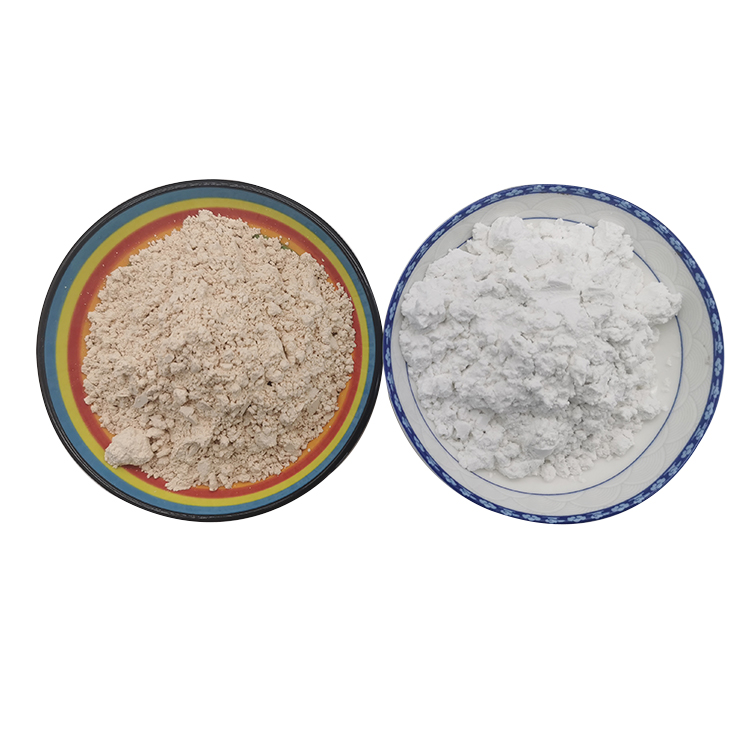Diatomaceous earth is composed of amorphous SiO2 and contains small amounts of Fe2O3, CaO, MgO, Al2O3, and organic impurities. Diatomaceous earth is usually light yellow or light gray, soft, porous, and lightweight. It is commonly used in industry as insulation materials, filtering materials, fillers, grinding materials, water glass raw materials, decolorizing agents, diatomaceous earth filter aids, catalyst carriers, etc. Diatomaceous earth is a type of siliceous rock mainly distributed in countries such as China, the United States, Japan, Denmark, France, Romania, etc. It is a biogenic siliceous sedimentary rock, mainly composed of the remains of ancient diatoms
The application scope of industrial fillers for diatomaceous earth in agriculture and pharmaceuticals: wettable powder, dry land herbicide, paddy field herbicide, and various biological pesticides.
Advantages of using diatomaceous earth: pH neutral, non-toxic, good suspension performance, strong adsorption performance, light bulk density, oil absorption rate of 115%, fineness ranging from 325 mesh to 500 mesh, good mixing uniformity, no blockage of agricultural machinery pipelines during use, can play a moisturizing role in the soil, loosen the soil quality, extend the effective fertilizer time, and promote crop growth. Compound fertilizer industry: Compound fertilizer for various crops such as fruits, vegetables, flowers and plants. Advantages of using diatomaceous earth: strong adsorption performance, light bulk density, uniform fineness, neutral and non-toxic pH value, and good mixing uniformity. Diatomaceous earth can become an efficient fertilizer, promoting crop growth and improving soil quality. Rubber industry: fillers used in various rubber products such as vehicle tires, rubber pipes, V-belts, rubber rolling, conveyor belts, and car foot mats. The advantages of diatomite application: it can significantly enhance the rigidity and strength of the product, with the sedimentation volume up to 95%, and can improve the performance of the product in terms of heat resistance, wear resistance, heat preservation, aging resistance and other chemical actions. Building insulation industry: roof insulation layer, insulation brick, calcium silicate insulation material, porous coal cake furnace, sound insulation and fireproof decorative board, wall sound insulation and decorative board, floor tile, ceramic products, etc;
Advantages of using diatomaceous earth: diatomaceous earth should be used as an additive in cement. Adding 5% diatomaceous earth to cement production can improve the strength of ZMP, and SiO2 in cement can become active, which can serve as a rescue cement. Plastic industry: Household plastic products, building plastic products, agricultural plastic, window and door plastic, various plastic pipes, and other light and heavy industrial plastic products.
Advantages of using diatomaceous earth: 3. It has excellent extensibility, high impact strength, tensile strength, tear strength, light and soft texture, good internal wear resistance, and good compressive strength. Paper industry: various types of paper such as office paper and industrial paper; Advantages of using diatomaceous earth: The body is light and soft, with a fineness range of 120 to 1200 mesh. The addition of diatomaceous earth can make the paper smooth, light in weight, strong, and reduce stretching caused by humidity changes. In cigarette paper, the combustion rate can be adjusted without any toxic side effects. In filter paper, it can improve the clarity of the filtrate and accelerate the filtration rate. Paint and coating industry: various paint and coating fillers such as furniture, office paint, architectural paint, machinery, home appliance paint, oil printing ink, asphalt, automotive paint, etc;
Advantages of using diatomaceous earth: pH value is neutral, non-toxic, with a fineness of 120 to 1200 mesh, a light and soft constitution, and belongs to the category of oil
Post time: May-26-2023


